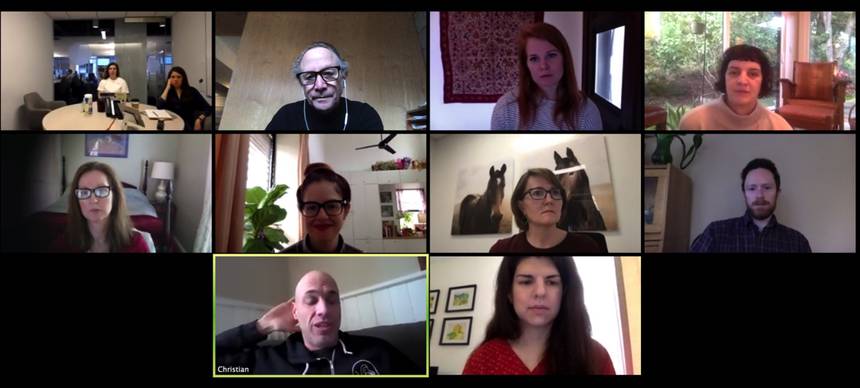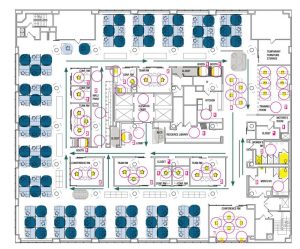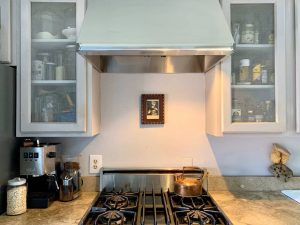Your office is where you are: an update

The coronavirus may change the way we think about the office for a very long time.
In 1985 Philip Stone and Robert Luchetti wrote in the Harvard Business Review that the new wireless office phones (infrared at the time) would change everything, that you would no longer be fixed to a desk but instead, Your office is where you are. More recently, I looked at how the smart phone was taking over the world, how you could do almost anything on it, and updated Stone and Luchetti to Your office is in your pants. We were breathless in our promotion of working from home; one writer on our late website Planet Green gushed:
“Let your boss know that green telecommuting is a growing trend, that eco-smart bosses and workers everywhere are giving this carbon-footprint-shrinking solution a go, and that you’d like to hop on the emission-reduction wagon.”
Most of my predictions about the future of the office were proven wrong; I thought videoconferencing was silly, “Everyone looked a bit embarrassed and spent their time looking at the screen, trying to look like they were interested.” But I have started using Zoom with our new Dotdash owners and it’s fantastic. I thought it was the End of an Aeron for fancy chairs: “They don’t have a function if you can stand up, move around, go wherever you want to go and still do your work. And that is where the workplace is going. The log on the beach will beat the Aeron every time.” But I have a smaller, cheaper, Herman Miller Sayle for when I have to sit down. I also predicted the end of the desk, noting that with the end of tethered computing, Your desk is where you are.
 Offices in Playtime, Jacques Tati/Screen capture
Offices in Playtime, Jacques Tati/Screen captureI was wrong so many times; the office has proved surprisingly resilient, until now. But suddenly, thanks to the coronavirus, everyone is working at home to reduce risk and population density, and I suspect that things won’t be the same when this is over. Niall Patrick Walsh of ArchDaily actually writes that the Coronavirus might be the beginning of the end of offices as we know them.
Let’s be clear. Coronavirus will not directly and irreversibly destroy the concept of working in traditional office buildings. However, it has indeed forced a major global ‘work-from-home’ experiment that, when businesses, cities, and societies return to normality, may cause a reflection on the benefits of working from home, or at the very least, a change in the traditional office typology.
Is the open office dead?
 Neo in his cubicle in the Matrix. The air quality isn’t too good here, either/Screen capture
Neo in his cubicle in the Matrix. The air quality isn’t too good here, either/Screen captureWalsh notes that the open office now accounts for 70 percent of office space. I have long been a fan, writing open offices for all, in which I said, “Open offices are more efficient in terms of use of space, more flexible and adaptable. They offer the employee more opportunity to work from home or in teams as required.” But I am rethinking; it is one think to deal with your neighbor’s noise but another to deal with her cough. When people come back to work in the office, I suspect that they will want a bit more space.
Is WeWork and co-working dead?
Ten years ago I thought that co-working was kaput because I thought it was all about having access to a scanner, photocopier or good internet connection, all of which you could do with your phone. I was frankly surprised by the huge growth in co-working, but have always predicted that it would vaporize, noting long before WeWork’s crash that “the idea of leasing long-term and subletting short term made no sense, given that your tenants could disappear back to their bedrooms and coffee shops in minutes when the economy turned. It’s what we used to call the ‘midnight shuffle’, when tenants were gone overnight.”
Now I think it’s dead because nobody is going to want to work in the same space with all those people you don’t know. It’s back to the bedrooms.
Are we not already there?
 Millie, my sometimes home office companion/CC BY 2.0
Millie, my sometimes home office companion/CC BY 2.0Ian Bogost writes in the Atlantic that you already live in quarantine, noting that it has never been easier to work from home.
In a way, “quarantine” is just a raw, surprising name for the condition that computer technologies have brought about over the last two decades: making almost everything possible from the quiet isolation of a desk or a chair illuminated by an internet-connected laptop or tablet.
It is one thing to have Zoom and Google Docs and Dropbox and Slack, but there are all those other things that can be done from home now that you couldn’t when I looked at this earlier.
Like Walsh at ArchDaily, Bogost wonders if this is the end of the office as we know it. “The benefits of a life online have begun to outweigh the costs for some Americans. The flip side of quarantine’s threat is technology’s promise—we have been preparing for the end of in-person work for some time.”
Never before in human history has it been so easy to do so much without going anywhere. Cinema box-office receipts fell sharply in 2019, as streaming entertainment became more plentiful and high quality. Apps and games and podcasts and digitally delivered matter of all kinds have followed suit. Now, absolutely drowning in it, the last thing anyone might worry about is getting bored at home.
Of course, all of this only applies to those of us, as Bogost notes, “whose jobs involve pressing buttons on keyboards to create or manipulate symbols into ideas.” The people delivering his DoorDash lunch or Amazon Prime Groceries, and all the millions of service workers who clean up after us or take care of us still have to go to work. There might well be a more serious class division, those who can huddle in their home with their high speed connection, and those who leave the deliveries on the front porch or pick up the garbage. But then, like quarantine, we already have that.
The coronavirus may change the way we think about the office for a very long time.







